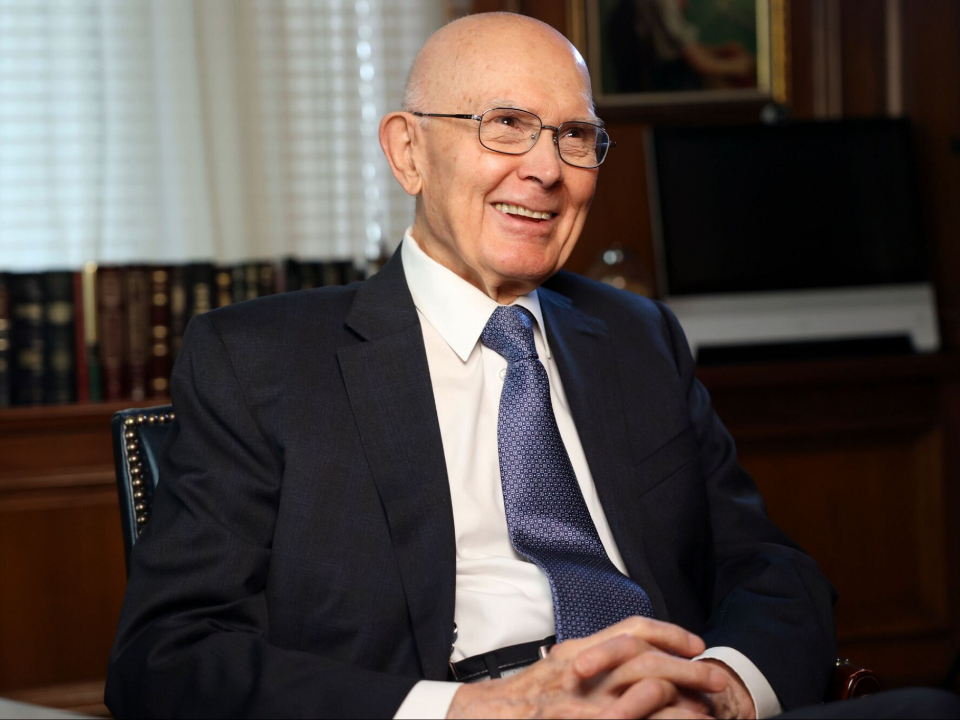
Oaks-90th
President Dallin H. Oaks, First Counselor in the First Presidency reflects on his life during an interview in his office in the Church Administration Building in Salt Lake City on Wednesday, July 27, 2022. Photo by Kristin Murphy, courtesy of Church News.Copyright 2023 Deseret News Publishing Company.This story appears here courtesy of TheChurchNews.com. It is not for use by other media.
By Joel Randall , Church News
As a former law professor, law clerk in the United States Supreme Court and justice in the Utah Supreme Court, President Dallin H. Oaks has “been led through a series of experiences that have enlarged [his] view” on religious liberty.
“If you have not thought seriously about religious freedom,” said President Oaks, First Counselor in the First Presidency, “or if you wonder why it is important, let me encourage you to think about, ‘Where would the absence of religious freedom lead society?’”
He said people today should do more to teach the general public the advantages given to everyone — believer and nonbeliever alike — when religious people have the freedom to worship how they choose.
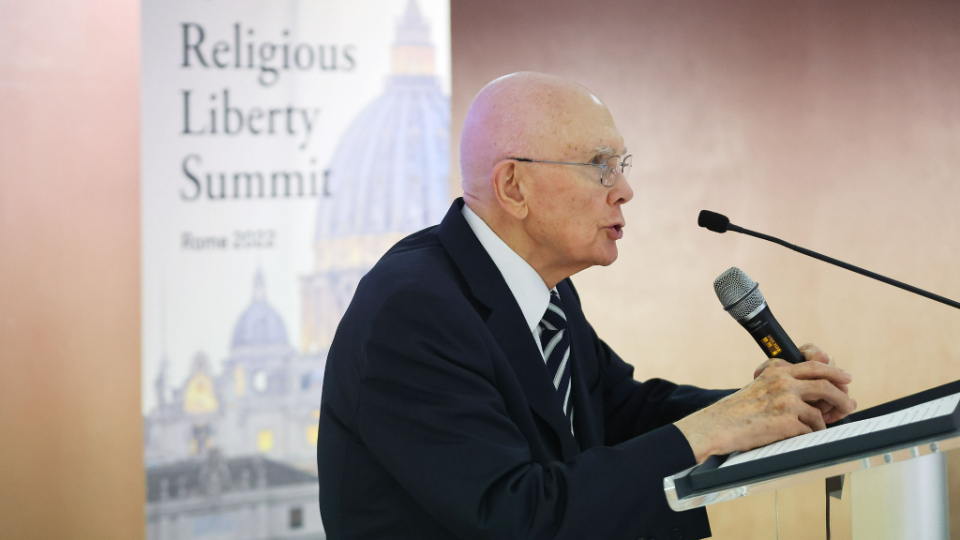
President-Oaks---Rome
President Dallin H. Oaks of the First Presidency delivers a keynote address at the Notre Dame Religious Liberty Summit in Rome, Italy, on July 20, 2022.“Everyone benefits when we have that freedom. But we need to make a better effort to teach that essential fact than any of us have done individually in the past.”
Last year, at the 2022 Notre Dame Religious Liberty Summit in Rome, Italy, he called for “a global effort to defend and advance the religious freedom of all the children of God in every nation of the world.” While in Rome, President Oaks spoke with the Church News about the importance of religious liberty to both those of faith and those of no faith. His full remarks will be featured July 4 in this week’s episode of the Church News podcast.
Religious Freedom for all Children of God
Ideal religious freedom, said President Oaks, should affect both believer and nonbeliever positively.
“The most effective representation of religious liberty,” he said, “is a representation that stands up for people of faith or no faith, because even people of no faith have a great interest in what can be done by religions and believing people who speak up for freedom generally, which we try to encourage.”
It is shortsighted of religious believers, said President Oaks, to view their beliefs and values as dominant over other concerns of their brothers and sisters. But by better understanding the beliefs and positions of others, “we’re better able to live peacefully,” he said, “and with mutual respect under a common set of laws and religious beliefs.”
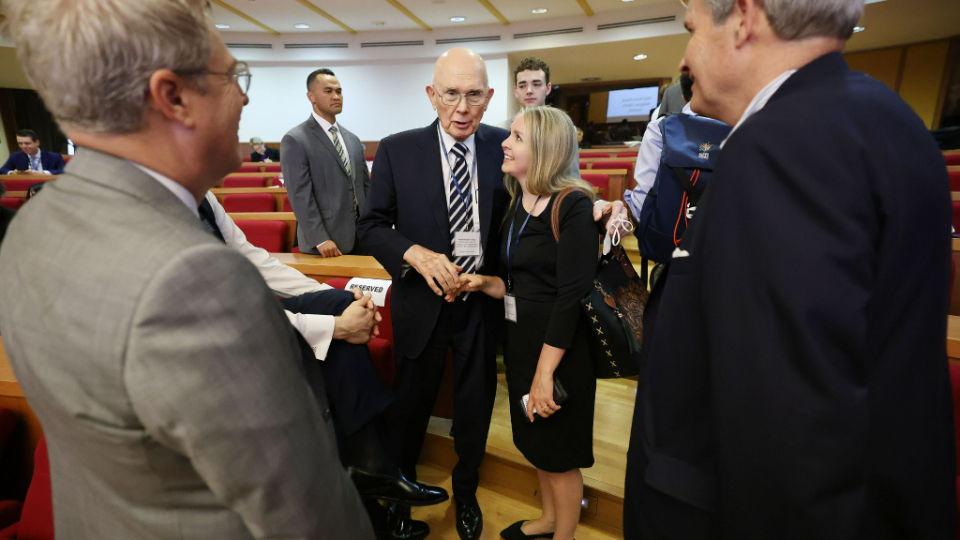
President-Oaks---Rome
Stephanie Barclay, Director of the Notre Dame Religious Liberty Initiative, visits with President Dallin H. Oaks prior to him speaking at the Notre Dame Religious Liberty Summit in Rome, Italy, on July 20, 2022.These common laws and mutual understanding happen as groups and individuals “unite with other like-minded organizations to promote religious freedom, not to be soloing according to individual preference and interest, but to have the broad interest of trying to unite together.” One example President Oaks gave of this is the cooperation between Latter-day Saints and the Roman Catholic Church.
President Oaks said, “We’ve got to think about religious freedom for all the children of God. And if we don’t, we’re falling short of what our divine Father in Heaven expects us to do. We are all His children. Some of us have blessings that we need to recognize and try to expand for the benefit of all of His children.”
Freedom to Meet as Religious Congregations
He said that “religious freedom is not just the right to believe; it is the right to carry our beliefs into action. And it is also the right to meet together, to have organizations that teach and advocate the religious principles that benefit society as a whole.”
The COVID-19 pandemic prevented faith groups worldwide from meeting in their congregations. Now that social restrictions have lifted, President Oaks urged religious people to get back together and to strengthen their communities and nations. “The right to act as an organization — as religions do in hospitals and caring for the poor, and in so many other illustrations — is a very important aspect of religious freedom.”
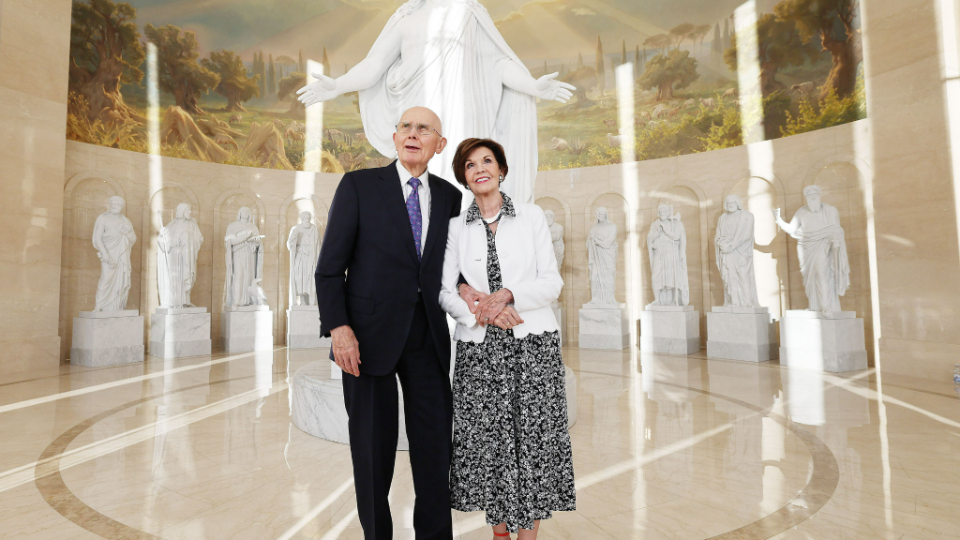
President-Oaks---Rome
President Dallin H. Oaks, and his wife, Kristen, look toward the magnificent Rome Italy Temple from the visitors' center on Tuesday, July 19, 2022.Coexistent with the right to meet as religious congregations is the right to build houses of the Lord in which to worship. The temple “stands as a great symbol of the continuity of life,” President Oaks said, allowing God’s children to offer the message of the restored gospel to those who died before they could receive it.
“We are put here on this mortal earth as the second act in a play that has at least three acts: We lived as spirits before we came here, we live in mortality for purposes the Lord has outlined, and life doesn’t end here; it goes on, our identity goes on, to Act 3. ... We can do much in the temples to make up for what our ancestors missed because of the conditions of their life.”
Thanks to religious freedom in many countries around the earth, the Church of Jesus Christ now has 315 temples announced, in construction or in operation. A massive 133 of those were announced in just the five years since President Russell M. Nelson became President of the Church in 2018.
This quick rate of temple growth, said President Oaks, is carefully planned and considered: “The objective is to get temples closer to the people so that any Latter-day Saint with a travel reasonable for their conditions and circumstances can go to a house of the Lord to make the essential covenants of mortality.”
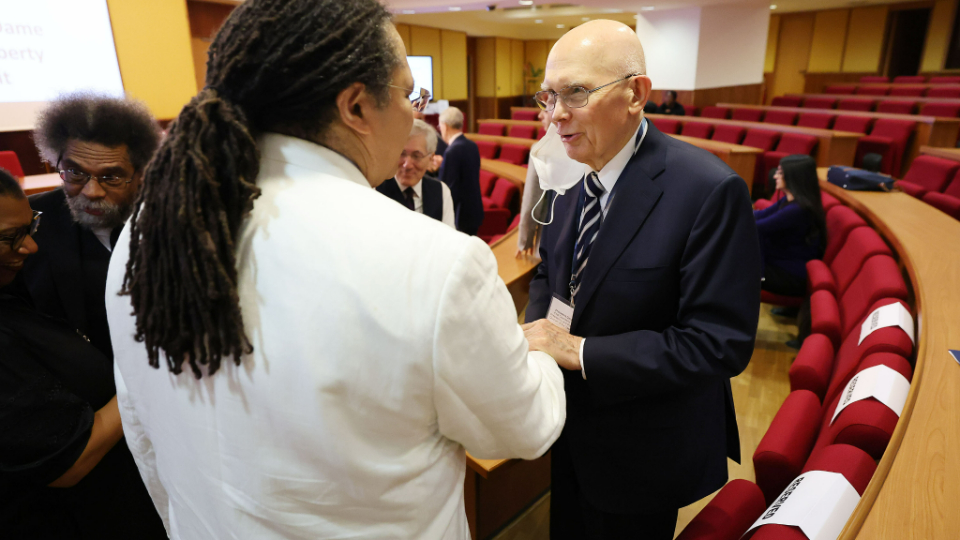
President-Oaks---Rome
G. Marcus Cole, Dean and Professor of Law at the Notre Dame Law School, greets President Dallin H. Oaks prior to the opening session of the second annual Notre Dame Religious Liberty Summit held in Rome, Italy, on July 20-22, 2022. President Oaks delivered a keynote address on Wednesday, July 20, 2022.Where Would Society Be Without the Freedom of Religion?
Fundamental to the doctrine of the restored Church, said President Oaks, is “the right and the obligation of individuals to choose to do what keeps the commandments of God and what furthers the purpose of the gospel of Jesus Christ as He taught it. And without religious freedom, we are not free to do that. The whole purpose and the essential environment of the Church depends upon freedom of choice.”
One thing that all people would lose in a world without religious freedom, he said, is the right to choose.

Oaks-90th
President Dallin H. Oaks, First Counselor in the First Presidency reflects on his life during an interview in his office in the Church Administration Building in Salt Lake City on Wednesday, July 27, 2022. President Oaks turned 90 on August 12. Photo by Kristin Murphy, courtesy of Church News.Copyright 2023 Deseret News Publishing Company.“I encourage young adults to consider where society would be, where our lives would be, where our religion would be if we did not have religious freedom.”
He continued: “The only way to make progress on religious freedom worldwide is for people who enjoy religious freedom to think about the circumstances of people who are not religious, not believers, have not yet seen the importance or can not enjoy religious freedom in the conditions of the country where they live.”
People from all around the world and across time have been forced to flee their homes for their religious beliefs or their country’s lack of religious liberty. “We need to be sympathetic, understanding and welcoming” toward them, said President Oaks, because most peoples on the planet also descended from refugees.
“It’s hard to find a country that was not affected by or inhabited by refugees at some point,” he said. “It is an old problem, and we need to live with it more effectively and sympathetically.”
Constitutional Freedoms
One paramount step that history took toward religious freedom was the United States Constitution, signed in Sept. 17, 1787. This historic document outlines principles of freedom that “we know to be inspired of the Lord for all people,” said President Oaks.
“And that is not every term or provision of the United States Constitution. But things like the sovereignty of the people, the duty of the government to look after the good of the people and to refrain from doing things that are simply in the selfish interest of those who are able to govern at a given time — those are some of the fundamental principles of the United States Constitution.”
A key addition to the Constitution came when it was amended on Dec. 15, 1791, to include the Bill of Rights. The First Amendment in the bill starts as follows: “Congress shall make no law respecting an establishment of religion, or prohibiting the free exercise thereof.”
President Oaks said, “It is important for Latter-day Saints worldwide to understand that there are fundamental principles in the United States Constitution that were established by God.”
And although it was drafted in the United States, “The importance of that document does not stop at the borders of the United States,” said President Oaks. “... So, different countries will adopt these principles or choose to ignore them, according to their own sovereignty and culture.”
To those with concerns about their government or trends they see in governments, President Oaks gave this guidance: “Trust in the Lord.”
He said, “There is a God in heaven, and He watches over all of His children in every nation. And while we are expected to do all that we can, when we’ve done all that we can within the conditions of our own government, the Lord is going to make up the difference for the benefit and blessing of His children in His own good time.”
Copyright 2023 Deseret News Publishing Company.
